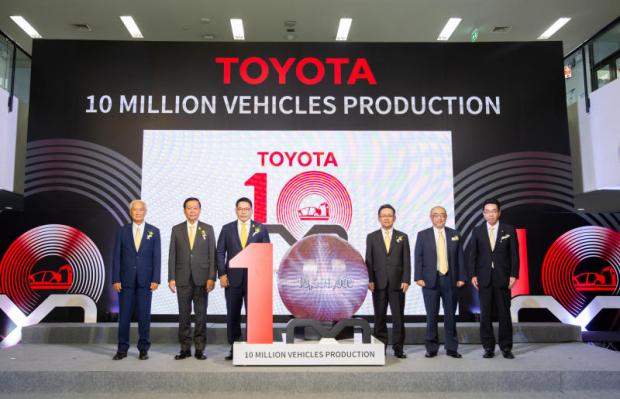
Toyota Motor Thailand is keeping with its plan to localise a battery plant and start production in early 2020, even though the local plant is facing a battery shortage for its hybrid electric vehicles (EVs).
Toyota produces two hybrid EVs -- the CH-R sport utility vehicle and the Camry sedan -- at its Gateway plant in Chachoengsao province. The battery shortage is affecting car deliveries to Thai motorists, in particularly the CH-R because the vital EV batteries have to be imported from Japan.
President Michinobu Sugata said Toyota is not adjusting its plan for a battery plant in Thailand, instead importing parts from Japan during the three-year lag.
"Everything remains as Toyota planned and we have to wait for the new battery plant for hybrid EVs in the next three years," he said.
The battery plant is a part of Toyota's hybrid EV project, for which it applied to the Board of Investment's (BoI) for privileges, and was the first carmaker to receive them last July.
The BoI said Toyota's total investment stands at 19 billion baht. It assembles 7,000 hybrid EVs a year, makes 70,000 batteries for electric cars and produces other parts such as doors, bumpers and front/rear axles, totalling 9.1 million units.
The CH-R is also the first model under the government's EV scheme, and a sales volume of 20,000 units is expected locally in 2018.
Ninnart Chaithirapinyo, chairman of the board, said the local battery plant is expected to produce both nickel metal hydride (NiMH) and lithium-ion (Li-ion) batteries, so the future facility can serve both hybrid and plug-in hybrid EVs for Toyota.
But Toyota is focusing on manufacturing and marketing of hybrid EVs in Thailand, so the battery plant will assemble the NiMH parts. The Li-ion batteries are for plug-in hybrid and battery EVs.
"Toyota aims to make the hybrid version a common platform in the Thai market and there will be more new hybrid models in the near future under the EV scheme," he said.
"But the future battery plant cannot support battery EV production. Once Toyota sees a clear big picture of EVs in Thailand, it can design the business direction to proceed with, either battery or fuel-cell EVs."
Toyota Motor Corporation aims to sell a total of 5.5 million units of EVs globally by 2030, compared with 1.52 million sold in 2017. Cumulative sales of EVs exceed 11.47 million units worldwide.
Separately, Toyota celebrated 10 million vehicles manufactured in Thailand with the Hilux Revo Rocco pickup.
The accumulated volume of 10 million vehicles comes from the production of three automobile assembly plants -- one in Samut Prakan and two in Chachoengsao, with an annual production capacity of 750,000 units.
A total of 5.8 million cars were sold domestically, while 4.2 million cars were exported to 120 countries, generating export value of 2.59 trillion baht for Thailand.
Established in Thailand in 1962, Toyota employs 14,500 people and sources the local auto parts market for 172 first-tier suppliers, who in turn employ 240,000.